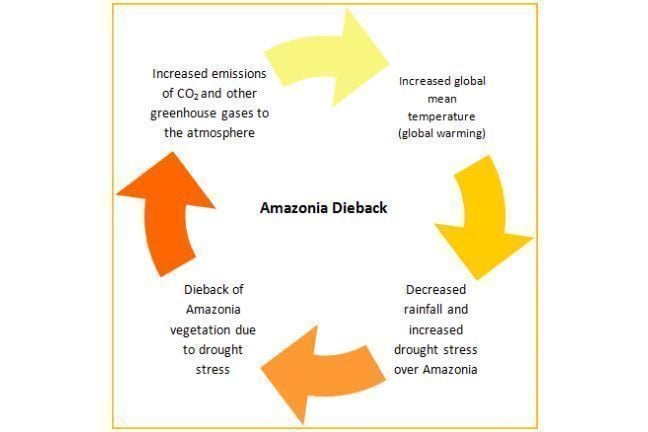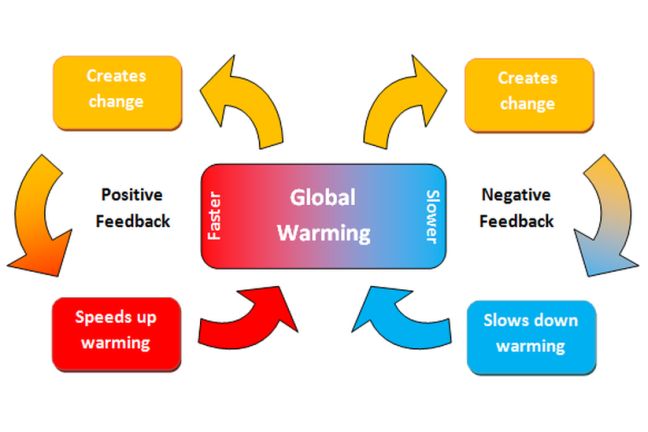Why Are Forests Important and How Can We Protect Them?

Share this step
Forests across the globe are important for three broad reasons:
- They support numerous indigenous communities who rely upon the ecosystem services that forests supply; e.g. medicine, food and timber. For many communities, forests also hold significant cultural and spiritual values.
- Forests are some of the richest areas for biodiversity on the globe. They provide a variety of habitats for plants, animals and micro-organisms.
- Forests provide an important regulating ecosystem service; i.e. they absorb and store carbon from the atmosphere which helps to mitigate global warming. Deforestation causes some of this carbon to be released back to the atmosphere, which can exacerbate global warming.
The concept of “Amazonia dieback”
Climate change could act as a major debilitating stressor – in combination with human deforestation – on maintaining the sustainability of forests across the globe. The Amazon and the concept of “Amazonia dieback” highlights this, specifically.
Global climate modelling experiments indicate that if climate change occurs under a “business as usual scenario” – i.e. without any attempts to reduce future emissions of greenhouse gases like CO2, there could be major loss of the Amazon rainforest from the year 2050 onwards. This would be as a result from decreased rainfall over the region and subsequent droughts, which impose a stress on the vegetation that currently covers much of the region. In turn, this could induce a positive feedback on global climate, whereby additional CO2 is released back into the atmosphere as a result of the death of vegetation and reduced photosynthesis and carbon storage. This release of CO2 would then further exacerbate global warming, leading to further Amazonia forest loss, and then further release of CO2; i.e. positive feedback. A simplified diagram of this positive feedback mechanism is displayed at the top of the page.
This feedback mechanism is just one of many feedback mechanisms that occur in the climate system and which can speed up or slow down global warming. For example, there is ice albedo feedback, and water vapour feedback. While the Amazonia dieback feedback mechanism is a positive feedback mechanism, because it speeds up warming of the atmosphere, there are also negative feedbacks, which can slow down warming. The next figure (below) shows how positive and negative feedback mechanisms affect global warming.

Positive feedback mechanisms such as Amazonia dieback in climate change highlight an important issue with respect to sustainability. As the positive feedback loop develops and becomes stronger and speeds up global warming, it may become more difficult to slow down global warming, thus making sustainability more challenging in the process. With the example of the Amazonia dieback feedback mechanism for instance, counteracting CO2 emissions from dieback by planting more trees would become more difficult as the feedback loop becomes stronger – more trees would need to be planted to counteract higher CO2 emissions from increased dieback. This implies that early intervention and sustainable management strategies are paramount at an early stage of the development of a positive feedback cycle.
While observations of past droughts in 2005 and 2010 indicate that there is potential for Amazonia dieback to occur and cause a positive feedback loop, the latest climate change modelling studies indicate that there is high uncertainty in knowing how Amazonia might respond under climate change scenarios in the future.
Climate modelling computer programs are very complex and simulations take several weeks or months to run on a powerful supercomputer. One recent simulation shows that by the end of the century a large fraction of the forested area is converted to desert as a result of climate change. Any such simulation is just one possible future and there are many uncertainties; i.e. any one simulated fate of the Amazon is not a 100% certainty. Other climate modelling experiments for Amazonia indicate that there is a 26% probability of a transition to a rainfall regime more appropriate for savannah grasslands, by the end of the century under climate change (Malhi et al., 2009). Yet other experiments have suggested that there is a 75% probability that Amazonia forest area could decrease by 3% for the period 2020–2029 and by 18% by the end of the century (Salazar et al., 2007).
Initiatives to manage our forestry resources
The Forest Stewardship Council (FSC) is a global-scale initiative with national and local-scale influence.
The formation of the FSC was largely in response to the failure of an intergovernmental process to agree on a global forest compact at the 1992 Rio Earth Summit.
The FSC is an independent, non-governmental, not-for-profit organisation established to promote the responsible management of the world’s forests. It is a multi-stakeholder organisation and through its membership, develops forest management and chain of custody standards, delivers trademark assurance and provides accreditation services to a global network of committed businesses, organisations and communities (FSC, 2012a).
Sustainability is central to the overall misson of the FSC, which is that they:
“Shall promote environmentally appropriate, socially beneficial, and economically viable management of the world’s forests” (FSC, 2012a).”
Their mission focuses upon the pillars of sustainability as follows:
- “Environmentally appropriate forest management ensures that the production of timber, non-timber products and ecosystem services maintains the forest’s biodiversity, productivity, and ecological processes.
- “Socially beneficial forest management helps both local people and society at large to enjoy long term benefits and also provides strong incentives to local people to sustain the forest resources and adhere to long-term management plans.
- “Economically viable forest management means that forest operations are structured and managed so as to be sufficiently profitable, without generating financial profit at the expense of the forest resource, the ecosystem, or affected communities (FSC, 2012a).
FSC certification
The FSC standards for forest management have now been applied in over 57 countries around the world. Forests are inspected and certified against strict standards based on FSC’s 10 Principles of Forest Stewardship. These ten principles (FSC UK, 2012b) are listed below. Forest inspections are undertaken by independent organisations, such as the Soil Association, that are accredited by the FSC. In order to be given FSC certification a forest must be managed in an environmentally appropriate, socially beneficial and economically viable manner. Forests that meet these strict standards are given FSC certification and the timber allowed to carry the FSC label. The FSC logo on a wood or wood based product is as assurance that it is made with, or contains, wood that comes from FSC certified forests or from post-consumer waste. The FSC label is currently found on over 10,000 product lines in the UK alone. It can appear on garden furniture, decking, sheds, conservatories, tools, kitchen, bathroom and general housewares, brushes, wall paper, flooring, doors, shelves, furniture, toilet tissue, paper, pencils etc. It can also be found on less obvious items such as charcoal, and there are now also coffins available.
The FSC’s 10 Principles of Forest Stewardship (FSC UK, 2012b)
- Compliance with Laws and FSC Principles
Forest management needs to respect all applicable laws of the country in which they occur. - Tenure and Use Rights and Responsibilities
Long-term tenure and use rights to the land and forest resources shall be clearly defined, documented and legally established. - Indigenous Peoples’ Rights
Recognition and respect for the legal and customary rights of indigenous peoples to own, use and manage their lands, territories, and resources is required. - Community Relations and Worker’s Rights
Forest management operations need to maintain or enhance the long-term social and economic well-being of forest workers and local communities. - Benefits from the Forest
Forest management operations should encourage the efficient use of the forest’s multiple products and services to ensure economic viability and a wide range of environmental and social benefits. - Environmental Impact
Forest management should conserve biological diversity and its associated values, so as to maintain the ecological functions and the integrity of the forest. - Management Plan
A management plan that is appropriate to the scale and intensity of the operations should be implemented and kept up to date. - Monitoring And Assessment
Monitoring should be conducted to assess the condition of the forest, yields of forest products, management activities and their social and environmental impacts. - Maintenance of High Conservation Value Forests
Management activities in high conservation value forests should maintain or enhance the attributes which define such forests. - Plantations
While plantations can provide an array of social and economic benefits, and can contribute to satisfying the world’s needs for forest products, they should complement the management of, reduce pressures on, and promote the restoration and conservation of natural forests.
Summing up
Forests are important for regulating the Earth’s climate. Large-scale deforestation could release CO2 into the atmosphere and exacerbate global warming. There remain uncertainties with regard to whether Amazonia dieback will occur in the future under climate change but this is not a reason to doubt present day action on managing forests sustainably. Sustainable forest management benefits indigenous forest-dwelling communities who reply upon forests for their survival and often place significant cultural and spiritual values on them. Furthermore, forests are a major source of global biodiversity.
There are many initiatives on global, regional and local scales that seek to protect the world’s forests. For example:
- The Amazon Region Protected Areas Project (ARPA)
- The Plant for the Planet “Billion Tree Campaign”
- The Rainforest Alliance
- The Programme for the Endorsement of Forest Certification (PEFC)
- The Sustainable Forests Partnership (SFP)
Do some research into one of these, or another initiative that you are aware of:
- What impact are these initiatives having? Can you cite short examples of impact?
- How are they proving able to cover the three pillars of sustainability: environmental protection, social equity and economic viability? Or if not, which ones don’t they cover?
Share this

Reach your personal and professional goals
Unlock access to hundreds of expert online courses and degrees from top universities and educators to gain accredited qualifications and professional CV-building certificates.
Join over 18 million learners to launch, switch or build upon your career, all at your own pace, across a wide range of topic areas.
Register to receive updates
-
Create an account to receive our newsletter, course recommendations and promotions.
Register for free








